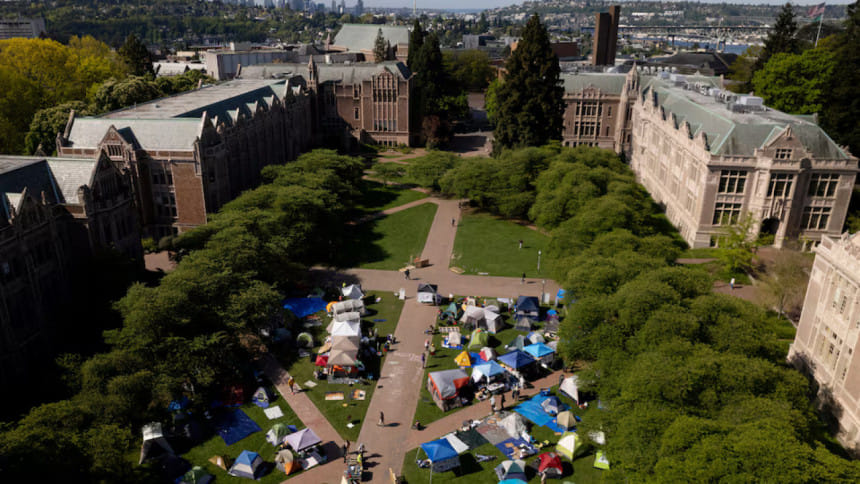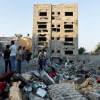Student protests in the US: Reclaiming the flames of human rights

I argued a few months back that the genocidal killings of innocent civilians, particularly of children in Gaza, within the context of the Israel-Palestine war, appear not as just another passing of a period but as an episode potentially signalling the impending doom of an objectively trustworthy international human rights law scheme, particularly with five states at the helm as permanent members of the UN Security Council. Four months later, it seems a tad hopeful, particularly with students and staff in the US universities vehemently protesting the US policies that staunchly support Israel, and thereby indirectly provide an impetus to the Israeli genocide.
Anti-establishment protests are generally handled with high-handed tactics by those in authoritative positions, essentially because establishment nourishes and sustains those who form part of the authority. And there has been no exception in the present context.
The protesters, with "an understanding of both worlds," stand firmly between the elite decision-makers at the top and the trampled-on Palestinians at the bottom. The protesters thus create an appropriate intermediate space to vernacularise the language of human rights, peace, and justice, upon providing for a corrective to the language of dominance, oppression, and hegemony. True that those in power are biased, that power today is defined by imbalance, and that the sham of balance is rigged, but above and beyond such top-down injustices and unfairness lies the unbending power of the people.
Indeed, the very ideas of fundamental freedom, dignity, and human rights are discursively embedded into multiple sites. Mass movements only show the site where the said ideas find flesh and blood. The protesting students chant "boycott apartheid Israel," thereby denouncing the racist policies that Israel propagates and the US sides with. They ask the university authorities to "divest from Israel," thereby warranting divergence from the deep-seated policies of extending unsighted support to Israel. Thus, the protesters unmask the aberrant intricacies and depraved symbols constructing the premise for the genocide now unfolding. However, the question is: how far can these protests take us?
In January, the International Court of Justice issued six provisional measures, ordering Israel to "take all measures within its power to prevent genocidal acts, including preventing and punishing incitement to genocide, ensuring aid and services reach Palestinians under siege in Gaza, and preserving evidence of crimes committed in Gaza." Israel, to date, continues to violate the said ruling by the world court. Moreover, the US abstained from voting in favour of the UN Security Council Resolution# 2728 on March 25 for an immediate ceasefire in Gaza, thereby not explicitly siding with the latest attempt to assuage the enormous humanitarian crisis there. Reportedly, the International Criminal Court (ICC) is considering issuing arrest warrants for Israeli top military and political figures for the commission of war crimes and crimes against humanity. However, the fact that neither Israel nor the US recognise the authority of ICC is yet another despairing reality within the international politico-legal spectrum.
Against this backdrop, perhaps it will be irrationally optimistic to imagine a system overhaul through the protests, because nothing short of such an overhaul can bring in true amends to the devastations caused. Indeed, the protests may not bring in ready-made solutions to the present crisis, precisely because racism is but an institutionalised reality in the now prevailing hegemonic-chauvinistic world order. Nonetheless, the protests are a downstream constraint on the illegitimate use of force and exertion of power. Within the illusion of sovereign equality imagining all states standing on an equal footing, the protests of people of various races, religions, sexes, genders and sexualities bring in fresh air of human equality.
In order to reclaim the transformative terrain and flames of human rights, we need to approach human rights from hitherto excluded locations and from the perspectives of hitherto excluded subjects. The task of so approaching is not quite straightforward. The task ought to involve challenging authorities, re-reading the status quos, and contesting the taken-for-granted assumptions. Through such an elaborate process only, "human rights can be remade in the vernacular" for the fringe-dwellers and the marginalised. Indeed, the protesters are an embodiment of both the excluded locations (which for them is the state of Palestine) and the excluded perspectives lying on the fringes of the international human rights paradigm.
The history of mass movements or student protests is not new in the United States. US campuses have witnessed protests during the Vietnam War, and more recently in support of Black Lives Matter movement and against the overturning of Roe v Wade (resisting the rollback of women's reproductive rights). All these movements were anti-establishment and rights-based. Such protests give us both purpose and meaning, through and in the face of adversities. Therefore, at the least, the protests tell us that it perhaps is premature to say that the end of human rights, or international law for that matter, is near. Indeed, the discourse on human rights is all the more relevant now.
Psymhe Wadud teaches International Human Rights Law at the University of Dhaka.
Follow The Daily Star Opinion on Facebook for the latest opinions, commentaries and analyses by experts and professionals. To contribute your article or letter to The Daily Star Opinion, see our guidelines for submission.

 For all latest news, follow The Daily Star's Google News channel.
For all latest news, follow The Daily Star's Google News channel. 











Comments